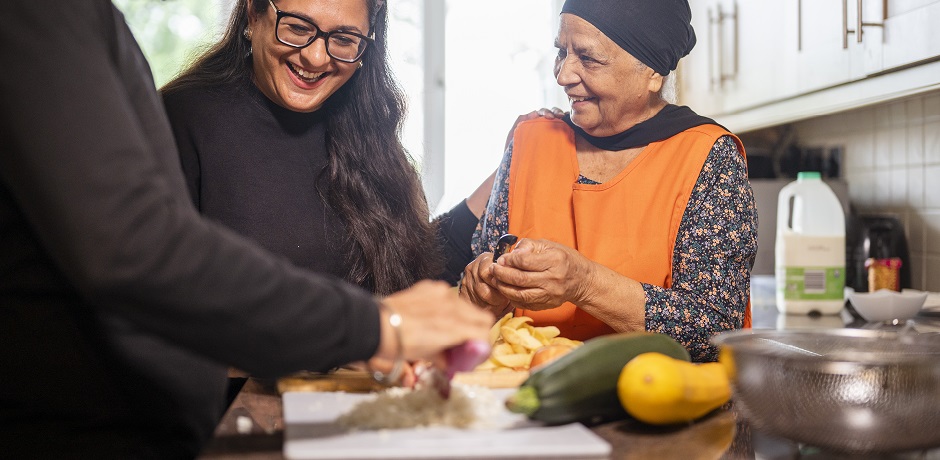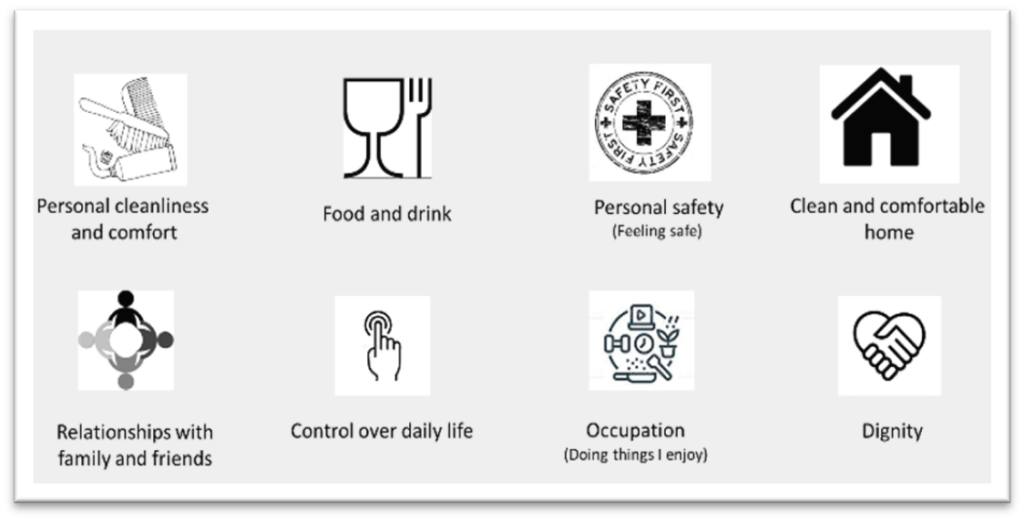)
Food and drink in later life: the role of homecare
In the UK there are around 1.3 million undernourished older adults. There are various reasons why some older people are at higher risk of undernourishment than others – for example, social isolation, health issues, limited mobility or cognitive impairment, accessibility of shops and food outlets, transport and limited household income. Most of the research about older people’s food and drink-related needs focuses on residential or nursing care homes, but less is known about older people living at home, who use homecare. Research led by Stacey Rand, Senior Research Fellow at PSSRU, University of Kent, finds that approaches to food and drink are often over-medicalised, and that the role and value of homecare in this area needs to be better understood.
What do we mean by food and drink-related needs/outcomes?
Maintaining a healthy, nutritious and sufficient diet and hydration are not the only needs older people have when it comes to food and drink. Food and drink also have personal, social and cultural importance. We may particularly enjoy or prefer certain types of food or drink. There may also be some foods or drinks that we choose not to consume, due to ethical, religious or cultural reasons (e.g. ethical vegetarianism/veganism) – or for our health (e.g. due to allergies or long-term conditions, like diabetes).
Food and drink can also play a role in how we celebrate special occasions or social events, from birthdays to religious or cultural festivals. Sharing in food and drink, whether in its preparation or consumption, with others can also be an important way of connecting with others or maintaining friendships and personal relationships. How we relate to food and drink can also affect how we think about ourselves.
Some of these aspects of food and drink can also become difficult for some older adults, alongside maintaining a healthy, nutritious diet and hydration. Community-based adult social care services play a vital role in supporting older people to live independently and well (‘outcomes’).
The role of homecare in supporting older adults with food and drink
Our review of 22 relevant studies found that some researchers had explored how homecare positively supports older people with their food and drink needs, through a person-centred care approach. This places the older person and (where appropriate) their family and support network as an equal partner in planning care. It also carefully considers the person’s preferences and wishes.
Homecare activities related to food and drink are varied and complex, but food and drink is often seen as ‘common sense’. This overlooks support with preparing meals, assistance with eating or drinking, monitoring whether a person eats and drinks enough, changes in weight and ability to carry out everyday activities, support with socialising, maintaining independence and dignity.
We also found that older people’s needs related to food and drink are often understood medically. There can be a narrow focus on malnutrition and dehydration – whether people eat and drink enough. Less attention is given to whether older people also enjoy what they eat and drink and whether they can socialise or stay active around food and drink (for example, by preparing meals, choosing ingredients, eating with others). These are important aspects of eating and drinking and can support someone to stay healthy and to live well.
The contribution of homecare to supporting older people in these ways is often overlooked and undervalued. Short visits, due to funding cuts or underinvestment, often limited between 15 to 30 minutes, do not always allow enough time to carry out important tasks related to food and drink in a person-centred way. Limited investment and time also affect collaboration with other healthcare professionals (like, community dietitians) and family carers, which would improve the care received by older people living at home.
Evidence from the Adult Social Care Survey
We also analysed a national survey of people using social care services in England, the Adult Social Care Survey (ASCS), to understand the extent of food and drink-related needs. This survey has collected information from people who use publicly funded social care services, since 2011. It includes the Adult Social Care Outcomes Toolkit (ASCOT) measure, which includes food and drink-related needs/quality of life outcomes. We used data from the last 12 years to identify trends over time and region, as well as the factors related to higher risk of unmet need.

The analysis of ASCS data revealed that self-reported unmet needs related to food and drink have increased from 4.3% of older people surveyed in 2011 to 8.1% in 2022. This increase has been reported both by older people who receive publicly managed or funded support and those who use homecare for other types of support, but not help with eating and drinking.
Investment into social care for community-dwelling older adults, on average, by local authority, was associated with lower levels of unmet need related to food and drink. This shows that investment into adult social care services, including homecare, makes a positive difference to older peoples’ lives.
Key implications
Our study has shown that the role and value of homecare in supporting food and drink needs of older people needs to be more widely recognised and understood. It is important to move beyond medicalised understandings, to consider also the effect on people’s lives – including personal, social and cultural aspects of eating and drinking – and how high quality care can support people and their families.
For further information and detail of the findings, see our guide to key findings.
Project team: Dr Stacey Rand (PI, University of Kent), Dr Lavinia Bertini (Brighton and Sussex Medical School), Alan Dargan (University of Kent), Professor Monique Raats (University of Surrey), Becky Sharp (ARC KSS), Della Ogunleye and Karin Webb (research advisor/PPI)
Read NIHR Social Care Speciality posts here →




